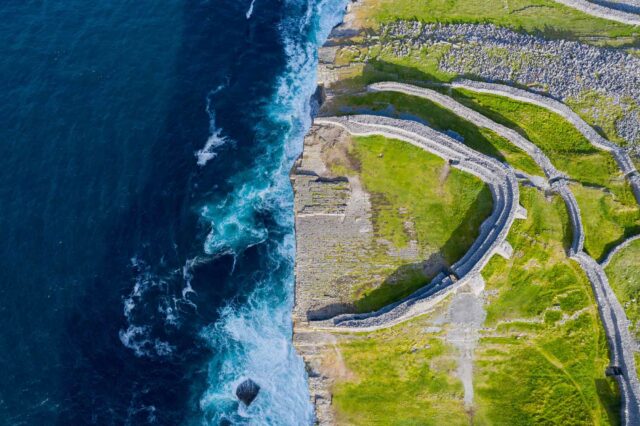Notice
Ballintubber Abbey is a National Monument in state guardianship
WARNING: It should be noted that these sites are unguided and a level of care and caution should be maintained during all stages of your visit. The Office Of Public Works (OPW) will not be held responsible for any damages, injuries, or losses that occur
Ballintubber Augustinian Abbey
It is said that the origins of Ballintubber Abbey date all the way back to 441 when St Patrick baptised people at a well and established a church. This is where the Irish for the town originates from: Baile Tobair Phádraig – St Patrick’s Well. A 35km pilgrim path is connected from the abbey to Croagh Patrick – Tóchar Phádraig.
The abbey itself dates back to 1216 when Cathal Crovdearg O’Conor – King of Connaught – founded the monastery for the Augustinians. Not only is the abbey associated with the influential O’Conor’s, but was linked with the de Burgo family as well, with members of the family still buried within the abbey grounds today.
One of the most famous is Theobald Burke, whose canopy tomb lies along the south wall of the church. Theobald was given a knighthood for his defeat of the Spanish Armada at Kinsale and was made the first Viscount of Mayo in 1627.
Just two years later Theobald was murdered close to the abbey.
Theobald was also the son of the Pirate Queen: Grace O’Malley.
The church was built in the cruciform shape, but was partially burned in 1265. It was rebuilt within 5 years. The cloisters likely date back to the 15th century, while the chapter house is probably earlier, around 13th century.
In 1653 much of the building was destroyed after a Cromwellian attack, and three stages of restoration took place over one hundred years.
The first was in 1846 where only the windows were repaired before the Great Famine hit.
The second was in 1889 with the roofing of the chancel and transepts.
The third and final stage took place over three years from 1963 under the watchful eye of Percy le Clerc, Inspector of National Monuments.
Today mass and visits occur within the restored abbey, and Ballintubber celebrates the fact that mass has been said in the abbey, without fail, since 1216, despite attacks that might have prevented it.
For details on guided visits see Ballintubberabbey.ie
Visit Historic Environment Viewer for more information on Ballintubber Abbey
Protect our Past - Click here to read about the importance of protecting our country’s unique heritage sites
This national monument is protected in accordance with the National Monuments Acts 1930 to 2014
Gallery
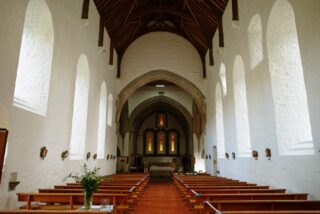
Interior of Ballintubber Abbey Credit Joyce Country Western Lakes Geopark 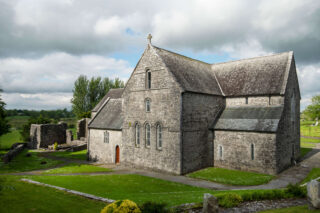
The abbey exterior Credit Photographic Archive, National Monuments Service, Government of Ireland 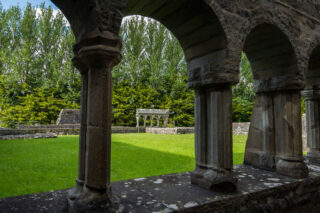
A view from the cloisters Credit Photographic Archive, National Monuments Service, Government of Ireland 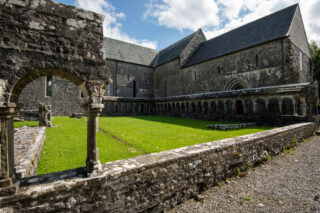
The internal courtyard and cloisters Credit Photographic Archive, National Monuments Service, Government of Ireland 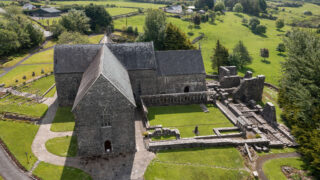
Ballintubber Abbey Credit Photographic Archive, National Monuments Service, Government of Ireland 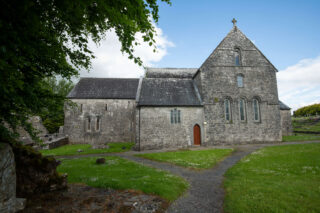
Pathway to Ballintubber Credit Photographic Archive, National Monuments Service, Government of Ireland
Nearby sites to visit
Aughnanure Castle
A historical gem in the heart of Connemara
Approx. 37.6 km from Ballintubber Augustinian Abbey
Ionad Cultúrtha an Phiarsaigh Conamara- Pearse’s Cottage and Visitor Centre
A cottage steeped in revolutionary history and Gaelic culture
Approx. 46.6 km from Ballintubber Augustinian Abbey
Athenry Castle
An emblem of Norman lordship
Approx. 62.0 km from Ballintubber Augustinian Abbey
Céide Fields Neolithic Site and Visitor Centre
The world’s most extensive Stone Age monument
Approx. 62.3 km from Ballintubber Augustinian Abbey
Rathcroghan Visitor Centre
Follow in the footsteps of Queen Medb at Connacht’s ancient capital
Approx. 67.7 km from Ballintubber Augustinian Abbey
Boyle Cistercian Abbey
Step back into Ireland’s monastic past
Approx. 69.0 km from Ballintubber Augustinian Abbey

